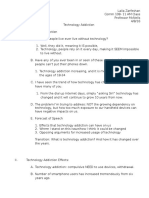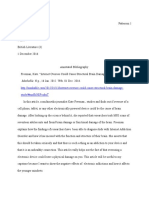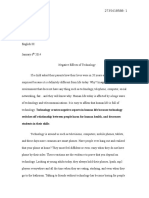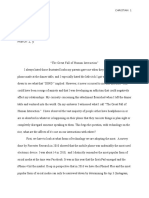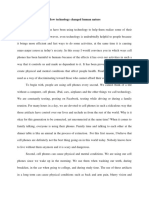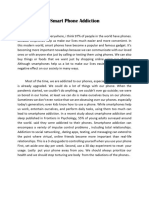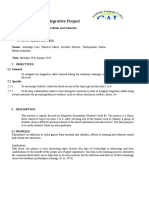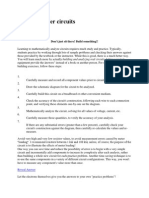Lizet Medina
ENG 1101
December 7,2022
Podcast: “Addiction with SmartPhones”
Introduction: Welcome to this podcast, where we will talk about the addiction with smartphones.
We will talk about the negative effects it brings and other changes that have occurred. Hope this
podcast will help us understand how to limit ourselves with smartphones and help us stop this
addiction.
Speaker: As we all know, pretty much everyone in the world has some type of smartphone. All
of them have access to apps that connect people throughout the world but can also cause
addiction problems.
Speaker: According to statistics about 7.26 billion people own a smartphone. That’s about 90%
of the population! Now as said before this could be seen as a good thing since about 90% of the
population can be connected. The bad thing is all the apps that cause us to be glued to our
phones. Most of them are social media apps like Facebook, Instagram, Twitter etc.
Speaker: I myself have some of these apps and of course they are addicting. Either I’m on them
for entertainment purposes, or catching up with my friends, looking at my favorite celebrities.
Whatever it might be, I sometimes spend more time on my phone than interacting in the real
world.
Speaker: According to some articles online having an addiction with smartphones can cause
things like anxiety, depression, and other issues. But most importantly we are losing our social
interactions. We are no longer having face to face conversations rather some prefer to have
online conversations.
Speaker: For example an article from Allred, & Atkin, D. talked about how people were feeling
anxious to talk to others in person and would much rather talk through texts or video calls. Now
this has me thinking about how slowly through the years we have relied on technology. Now
there are ways for us to just call our friends or family and not have to see them in person. I feel
like we are losing that time to spend with our friends and family.
�Speaker: Another article from Zhan, Wei, Q., & Hong, J.-C talks about the smartphone addiction
increase throughout the pandemic. We have recently gone through a pandemic that caused us to
isolate ourselves therefore increasing the use of our phones. I believe we can all relate to that.
My friends and family would always be on their phones because there was not a whole lot to do.
Although it was entertaining while it lasted, the article reiterates that it has caused people to have
social anxiety and not want to interact with others in public.
Speaker: According to that article that isolation could have been carried on. Leading many
people to want to be alone most of the time and of course not wanting to interact with others. I
have seen this myself with people on the streets, on the subway, in schools, even workplaces. A
small device has had a huge impact on us. It’s just something we can’t seem to leave.
Speaker: Now after hearing about this addiction and what it can do. There are some ways to stray
away from our smart devices. One way could be by minimizing the use of apps on your
smartphone. I know that it can be difficult but doing this could certainly increase our needs to
talk to people in person. Try talking to your friends in person and not through social media.
Speaker: Another way of getting away from your smartphone could be finding a new hobby like
painting, drawing, going out on walks etc. For example, I have found a new hobby of crocheting.
Instead of being on my phone I spend my time crocheting and talking with my mom. I usually
wouldn’t spend much time with her but now I do. It’s the small things like that, that can help us
stop being addicted to a smartphone.
Speaker: I wanted to have a brief talk about this because I feel like there isn’t enough light on
this topic. We all know that there is an issue with smartphones and we need it to stop. It can
bring many mental health issues. As well as bringing that connection back of talking in person.
Something that I feel is being lost. Overall we need to stay away from smartphones as long as
possible so that we can live in a “normal world.”
Speaker: I hope that this short podcast helped you realize how much smartphones and technology
has taken away from us. And consider spending less time o it.
